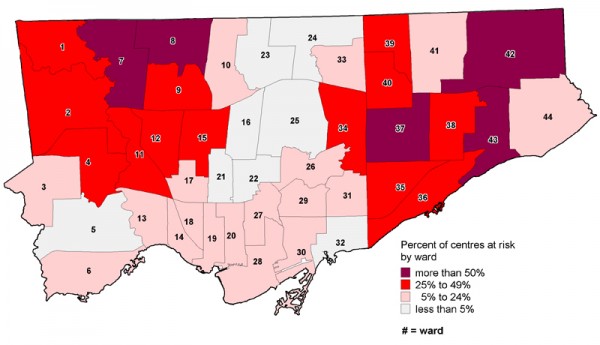
In Ontario, Canada, almost half of the province’s four- and five-year-olds will attend full-day kindergarten this fall.
Many schools have already begun registering children for the upcoming school year.
September 2012 marks the third year of the province’s new full-day kindergarten program.
Full-day kindergarten will be available in all elementary schools by September 2014.
As the Full-Day Kindergarten is being implemented across Ontario, the Toronto’s child care system and child care operators will be adversely affected as follows:
- accessibility and affordability of child care in Toronto is at risk
- by September 2012, almost 7,000 children will leave the child care system to start full-day kindergarten
- consequently, child care operators will experience increased financial and operational pressures that may force them to close their doors
- without additional funding, Toronto could lose 23 per cent or 7,284 licensed child care spaces at a time when more than 20,000 children are waiting for a space
- if resources are made available, the number of licensed spaces in the city could decrease by as little as 7%
In response, Toronto City Council has asked the Ontario Government to provide:
- $27.4 million in one-time capital funding to assist child care providers in renovating space vacated by those attending full-day kindergarten to accommodate younger children.
- The care for younger children requires certain types of facilities according to provincial regulations.
- To date, the Province has provided $1.1 million over three years.
- $27 million in fee subsidies for younger children and transitional funding to stabilize the child care system and to ensure that it remains stable, sustainable and affordable for families.
- To date, the Province has provided $4 million.
Henceforth, the City of Toronto is holding the following public meetings about the potential impacts of Full-Day Kindergarten on child care in Toronto:
- Tuesday, February 21, Victoria Village Public School, 88 Sweeney Dr.
- Tuesday, February 28, St. Jude Catholic School, 3265 Weston Rd.
Join local Councillors, City staff and child care operators at one of these two public meetings above to discuss the current state of child care and what is required to ensure that it continues to be available and affordable for Toronto families.
Information will be collected in accordance with the Municipal Freedom of Information and Protection of Privacy Act. With the exception of personal information, all comments will become part of the public record.
Contact Info
Phone within Toronto city limits: 311
Phone outside city limits: 416-392-CITY (2489)
(can be used within Toronto if you can’t reach 311)
TTY customers: 416-338-0TTY (0889)
Fax: 416-338-0685
E-mail: 311@toronto.ca
If your matter is urgent, please call City of Toronto. They are open 24/7.
Always call 911 for emergencies.
Toronto, Ontario, Canada
NEWS RELEASE
February 17, 2012
Public meetings to discuss the impacts of Full-Day Kindergarten on Toronto’s child care system
The Ontario Government has introduced Full-Day Kindergarten (FDK), which could have an impact on the availability of child care spaces in Toronto. Toronto City Council has asked the Province for additional funding so that child care spaces will not be lost.
The City of Toronto is holding two public meetings about the potential impacts of Full-Day Kindergarten on child care in Toronto:
• Tuesday, February 21, Victoria Village Public School, 88 Sweeney Dr.
• Tuesday, February 28, St. Jude Catholic School, 3265 Weston Rd.
“The City is willing to work with the Province on a transition plan so these spaces continue to be available for Toronto’s economic and social well-being,” said Councillor Giorgio Mammoliti (Ward 7 York West), Chair of the Community Development and Recreation Committee.
The City conducted an in-depth, site-by-site analysis to determine the impact of FDK on child care and the capital and operating requirements to maintain the licensed child care sector. Without additional funding, Toronto could lose 23 per cent or 7,284 licensed child care spaces at a time when more than 20,000 children are waiting for a space.
City Council has requested that the Ontario Government provide:
• $27.4 million in one-time capital funding to assist child care providers in renovating space vacated by those attending FDK to accommodate younger children. The care for younger children requires certain types of facilities according to provincial regulations. To date, the Province has provided $1.1 million over three years.
• $27 million in fee subsidies for younger children and transitional funding to stabilize the child care system and to ensure that it remains stable, sustainable and affordable for families. To date, the Province has provided $4 million.
Media are invited to attend the two public meetings. Additional information is available at http://toronto.ca/supportchildcare.
Toronto is Canada’s largest city and sixth largest government, and home to a diverse population of about 2.7 million people. Toronto’s government is dedicated to delivering customer service excellence, creating a transparent and accountable government, reducing the size and cost of government and building a transportation city. For information on non-emergency City services and programs, Toronto residents, businesses and visitors can dial 311, 24 hours a day, 7 days a week.
————————————-
You may also want to know:
